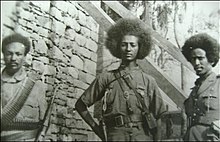Jagama Kello
Jagama Kello Jaagamaa Keelloo | |
|---|---|
 | |
| Born | 29 January 1920[1] Dendi, Shewa Province, Ethiopian Empire[2] |
| Died | 7 April 2017 (aged 97) Addis Ababa, Ethiopia |
| Allegiance | |
| Service | Army |
| Years of service | 1935–1974 |
| Rank | Lt. General |
| Battles / wars | Second Italo-Ethiopian War World War II Ethiopian-Somali War of 1964 Bale Revolt |
Jagama Kello (Oromo: Jaagamaa Keelloo; Amharic: ጃጋማ ኬሎ; 29 January 1920 - 7 April 2017) was an Ethiopian military officer in the Imperial Ethiopian Army.[1][2][3][4][5][6][7][8][9]
Early life
[edit]Jagama Kello was born on 29 January 1920 in Ginchi area of Shewa, not far from Addis Ababa. He was an ethnic Oromo and hailed from the Tulama clan. His father was a very wealthy landlord who owned 900 acres of farmland.[8]
Life as an Arbegna
[edit]
When the Italians invaded Ethiopia in 1935, at the age of 15 Jagama and his older brother went into the bush to join the Arbegnoch. At first he had no gun – only his elder brother had one. But they ambushed Italian troops and gradually armed themselves. Peasants joined the struggle and by the end of the war they had over 3,000 fighters under their command, his forces were active in the mountainous areas of western Shewa.[8]
On 2 December 1940, he and his soldiers raided the Italian garrison at Addis Alem. They killed 72 Italians in the engagement including their commander Vittorio Casardi, and captured over 2,000 rifles.[10]
On 5th May 1941, after years in exile in Britain, the Emperor Haile Selassie returned to his capital. Jagama, who had received no British help during the 5 years of the war, refused to go to Addis Ababa for the ceremony. In the end the Emperor came to Ginchi. Jagama says he put his 3,500 troops on parade, to greet Haile Selassie. He was then driven in the Emperor’s own car to his palace, where he was awarded a gabardine coat and a gold watch. But the war was not yet over. Jimma was still under Italian control. The Emperor asked Jagama for help and he says he led his forces into battle. Reports suggest the area was ‘swarming with Patriots’ – many of whom may have been loyal to Jagama. He told the BBC that his forces captured some 500 Italian soldiers, whom he handed over to the British.[8]
Jagama became dangerously ill with malaria and was taken to hospital in Addis Ababa. But the British doctor refused to treat him until he had a haircut. But Jagama was very proud of his afro, since it had scared his enemies and he refused and went home. It was only when Emperor Haile Selassie came to his house and personally ordered that his hair be cut to save his life that he gave in and accepted his fate.[2]
Later career
[edit]Jagama remained in the military, rising to the rank of Lieutenant General. He remained loyal to Emperor Haile Selassie when others deserted him, and was one of a number of officers who refused to participate in the ill-fated coup of 1960.
He died in Addis Ababa at the age of 97.
References
[edit]- ^ a b Jagama Kello Part 1 (Online video clip) (in Amharic). Finfinnee Radio. 2015-10-21 [2011-01] – via Youtube.
- ^ a b c Plaut (2012).
- ^ Jalata (1998)
- ^ Pearce (2014)
- ^ Østebø (2011)
- ^ Markakis (2011)
- ^ Henze (2016)
- ^ a b c d Plaut (2009).
- ^ "Ethiopian Hero Gen. Jagama Kello Who Fought Fascism Dies at 96". Tadias. Retrieved 21 July 2019.
- ^ Forgacs 2014, pp. 133–135.
Works cited
[edit]- Forgacs, David (2014). Italy's Margins: Social Exclusion and Nation Formation since 1861. Cambridge Social and Cultural Histories. Vol. XX (illus. ed.). Cambridge University Press. ISBN 978-1-107-05217-8.
- Jalata, Asafa (1998). Oromo Nationalism and the Ethiopian Discourse: The Search for Freedom and Democracy. The Red Sea Press. p. 198. ISBN 1569020663.
- Pearce, Jeff (2014). Prevail: The Inspiring Story of Ethiopia's Victory over Mussolini's Invasion, 1935-1941. Skyhorse Publishing, Inc. ISBN 978-1632200969.
- Østebø, Terje (2011). Localising Salafism: Religious Change among Oromo Muslims in Bale, Ethiopia. BRILL. p. 152. ISBN 978-9004217492.
- Markakis, John (2011). Ethiopia: The Last Two Frontiers. Boydell & Brewer Ltd. p. 152. ISBN 978-1847010339.
- Henze, Paul B. (2016). The Horn of Africa: From War to Peace. Springer. p. 83. ISBN 978-1349214563.
- Plaut, Martin (2009-11-09). "The Africans who fought in WWII". BBC News. Archived from the original on 2017-01-19. Retrieved 2017-01-07.
- Plaut, Martin (2012-05-11). "Ethiopian general who fought fascism: Jagama Kelo". Martin Plaut. Archived from the original on 2016-05-08. Retrieved 2017-01-07.
